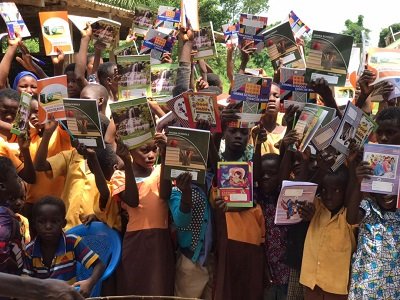Hot!
Goldcoast Literacy Programme supports children academically …Daisy Mina Antwi leads initiative

It has been 48 editions since January this year as we highlight the stories of vibrant personalities who push boundaries to achieve results or make lasting impact in their respective fields.
We wrap up the year today with the spotlight on a young philanthropist and education advocate, determined to improve literacy in children across the country.

Ms. Daisy Mina Antwi and her organisation, Goldcoast Literacy Programme, (GLP) go the extra mile to provide basic tools and resources to less privileged children, especially in rural communities, to enable them rub shoulders with other compatriots elsewhere.
The Founder, in an interview with The Spectator, expressed her passion and various interventions GPL continues to make to ensure ‘’children read and communicate very well in good English.’’
Concept
Ms. Antwi, running the foundation since 2017, said she took up the task after identifying the reading and language deficiencies of some children within her locality.
‘’I grew up around Cantonments and Labone [in Accra] but when I moved to settle at Kasoa in the Central Region, I noticed some children in Junior High Schools had challenge expressing themselves in the English Language.

‘’I started engaging some of them after school and rewarded those who were able to spell and form correct sentences but I noticed the challenge was not only in my area so I decided to take it a step further,’’ she said.
Explaining the choice of name for the organisation, the communication enthusiast said she wanted a unique identity that would resonate with younger and older generations.
According to her, GLP is hoping for ‘’an illiteracy-free world where every child in Ghana learns how to read and have fun doing it.’’
Projects
Since its inception, Ms. Antwi said the organisation has funded the educational needs of deprived children, supported teenage mothers to return to school, and has initiated the ‘’child-to-a-book project, among other projects.
It intends to also build ultra-modern ICT laboratories and refurbish dilapidated school blocks in selected schools across the country.
In 2020, GLP, she noted, introduced the ‘’WashedHandsOnDeck’ initiative as well as “Immune Your Mind Outreach” to educate children and communities on COVID-19 safety protocol.
These initiatives, Ms. Antwi said, were recognised and named ‘Heroes of COVID-19’ in June 2020 and April 2021 by The African Dream LLC, a United States Communication Research Consultancy, and was again nominated for the FortyUnder40 Awards in 2020.
She said the organisation had a number of students at different levels of education who had benefited from its scholarship and welfare programmes as it continued to identify and make impact in other communities.
GLP had recently reached out to beneficiaries at Nzulezu in the Western Region as well as pupils of Abekwai D/A Primary School near Wenchi in the Bono Region. Pupils at Nima and Mamobi in Accra were not left out.
‘’Though we started with children, we later thought it wise to broaden our scope to involve the communities as well. When we go out, we assign volunteers to speak on various topics that would boost the morale of the children.
‘’After every outreach, the team does a follow up to monitor the progress of the children who have been supported,’’ she explained.
In spite of funding challenges, the organisation intends to reach out to about 300 pupils at Mafi Yingo in the Volta Region by January 2022 and rehabilitate school blocks at Wechiau-Bao Catholic Primary School in the Wa West District of the Upper West Region.
Challenges
GLP, she said, has eight permanent members as of now but recruits volunteers whenever there is an outreach, adding that though it receives support in the form of logistics, other overhead costs are personally funded.
Ms. Antwi identified lack of cooperation by some community members, bad access roads to rural communities, lack of commitment on the part of some beneficiaries as some limitations of the programme.
Nonetheless, the programme has managed to remain on track throughout the years and hopes to make further progress in the years ahead.
Partnership
She said the programme supported also some street children to return to school, after the necessary background checks had been done but observed that some people did not appreciate the essence and benefits of education hence the need for more interventions in the sector.
‘’Government cannot do it alone and we have to provide the needed support in our small ways with every means possible,’’ she noted.
The founder has, therefore, called for more support from individuals and corporate bodies towards the Gold Coast Literacy Programme and other educational and social interventions.
‘’The outreaches are just one aspect of the things we do. We need more organisations to partner us in all areas so we can achieve more,’’ she stressed, and insisted that parents must continue to inculcate reading habit and English Language expressions in their wards just as they were taught Ghanaian Languages.
“Reading opens doors to things unseen. We have to get the children to read. Let us speak the local language but make a conscious effort to get to the children to read and make learning fun for them,’’ she said.
Background
Ms. Antwi hails from Elmina in the Central Region. She studied General Arts at Wesley Grammar School, completed in 2013 before proceeding to Crystal Galaxy College to read Ticketing and Reservation, Passenger Handling, Customer Care and allied subjects.
She has volunteered for TEDxLabone Ghana, Youth in Sustainable Sanitation, and is associated with World Speech Day Ghana, an organisation which trains children in public speaking.
The 28-year-old, who is set to publish her first novel soon, says she wants ‘’every child to understand the art of speaking and be able to express themselves properly.’’
By Ernest Nutsugah
Hot!
Four ‘Pragya’ Operators fined GH¢ 2,400 for obstructing public road at Agbogbloshie

Four tricycle operators, popularly known as ‘Pragya’, have been prosecuted and fined GH¢600 each equivalent to 50 penalty units by the Accra Metropolitan Assembly (AMA) Sanitation Court for obstructing public roads at the Agbogbloshie Market.
The offenders, who were arrested by Public Health Officers of the AMA during a routine enforcement exercise, pleaded guilty to the offence and were subsequently convicted by the court.
The four operators were among the 21 offenders recently arrested at the Agbogbloshie Market for various sanitation and public order violations, including selling on open drains, obstructing walkways, and trading at unauthorised locations.
Speaking after the court proceedings, the Head of Public Health at the AMA, Madam Florence Kuukyi, said the court was lenient with the offenders since it was their first appearance, hence the fine, and warned that subsequent offenders would face stiffer penalties, including imprisonment.
Hot!
Police arrest suspect in Taxi driver murders in Accra

The Ghana Police Service has arrested a man believed to be behind a series of robberies and killings of taxi drivers in the Greater Accra Region.
According to a statement from the Criminal Investigation Department (CID), the suspect, Peter Akakpo, also known as “Dompe,” was arrested on October 13, 2025, at Kasoa-Domeabra.
Police say he is an ex-convict and is believed to have worked with another suspect, Vincent Gbetorglo, who was arrested earlier on June 30, 2025.
The arrests follow investigations into the deaths of two taxi drivers at Sakaman Blue Lagoon on May 9 and June 15, 2025. Police say the suspects contacted the victims before the attacks.
The Anti-Armed Robbery Unit of the CID led the investigation, using intelligence and surveillance to track down the suspects.
Police say efforts are being made to recover the vehicles of the murdered drivers.
The CID assured the public that investigations are still ongoing and promised to provide updates as new information emerges.
By: Jacob Aggrey






